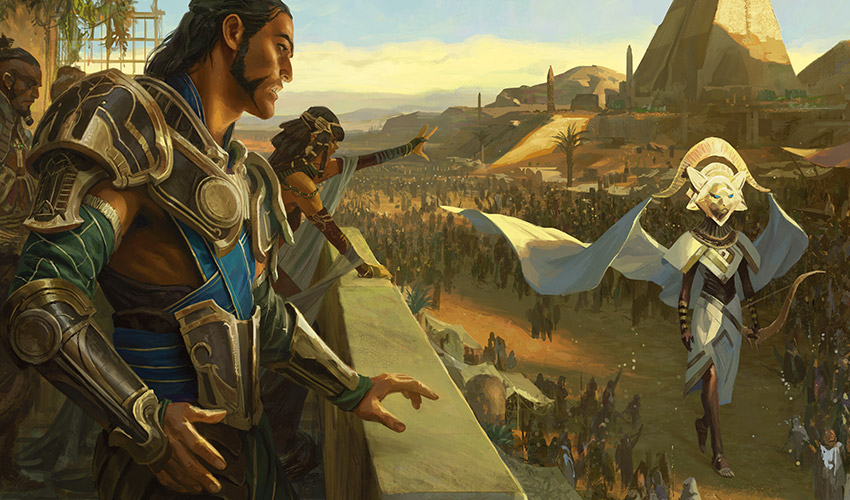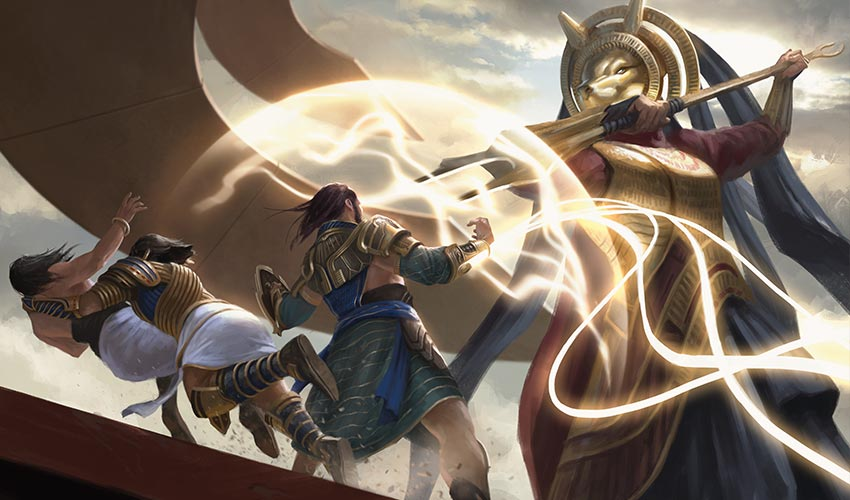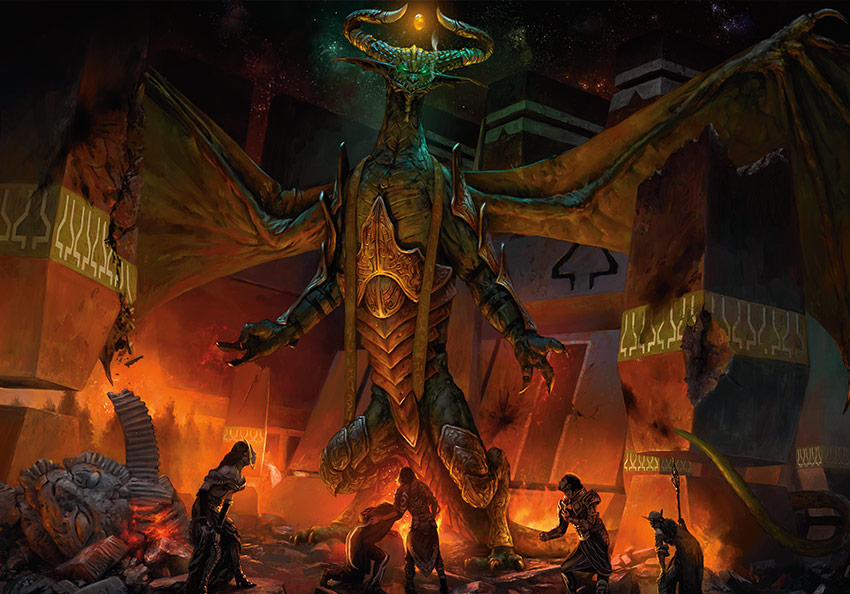This is part five in our series exploring the life of Gideon Jura. Part one. Part two. Part three. Part four.
When the Gatewatch planeswalks to Amonkhet, they are greeted by a vicious sandstorm and an endless tide of zombies. At first, there are just humanoid corpses, mummified by the endless heat. The planeswalker are able to handle them with little difficulty, but then gigantic sand wurms join the party. Even when killed, the wurms rise again to keep fighting, and the Gatewatch is swiftly overwhelmed. Gideon Jura is the last man standing, and all of his comrades are in mortal danger. He can only be in one place at a time, which means he can only save one of them. Someone he cares about is going to die, and once again, it will be his fault.
But before he is forced to choose, salvation arrives. An arrow, blinding white, splits the air and atomizes an attacking sand wurm. The zombies immediately scatter, but that does not save them. A colossal figure charges into view and runs down the fleeing zombies, impaling them with a spear the size of a tower. Then she turns and locks eyes with Gideon. With the head of a jackal and a palpable aura of golden fire, the figure can only be a god. She regards Gideon for a moment, then nods to him and dashes away. Overwhelmed, Gideon collapses into the whirling sand.
The unseen archer was Oketra the True, the cat-headed god of Solidarity. The spearwoman was Hazoret the Fervent, the jackal-headed god of Zeal. His saviors were the White and Red gods of Amonkhet, and that alone should tell you where this is headed.
On Kaladesh, Gideon doubled down on White. He once again shoved his Red side deep down within him and decided to soldier on as Gideon Jura, implacable hero-man. He recants the passion he fought with on Zendikar, walks back his unguarded friendships with the others, and resolves to embody everything White represents: service, duty, order, honor, and obedience. Perhaps because of that choice, Amonkhet is the first time he really notices the Gatewatch’s chaos and disunity:
He scowled at Liliana’s back as she walked past him, smirking at the success of her efforts to agitate Chandra and fluster Jace. She had pulled them out of the fire on Innistrad, no doubt. But since then she had been nothing but contrary and mocking. She had no sense of what it meant to be part of a team. She was just along for the ride.
And why not? he thought. We’re all in this for our own reasons. It’s so damn messy—all of us, all our emotions and drives and goals.
The Gatewatch has never been a well-oiled machine, but that did not impair their effectiveness on Zendikar, Innistrad, and Kaladesh. In fact, Gideon was the one who first encouraged them to work together despite their profound differences, but now that he’s shrunk back into his White mask, their lack of cohesion is starting to bother him. They must compare poorly to the disciplined armies of Bant, or even the precise and well-organized Consulate soldiers he fought on Kaladesh.

It is in this mindset, chewing over their frailties and divisions, that Gideon meets Oketra for the first time.
They turned down an avenue, and once again Gideon found himself in the presence of a god.
Even before he saw her, he felt all his unease and anxiety melt away and a calm settle on his heart, accompanied by a warm shiver that started in his spine and awakened every nerve in his body.
Then she looked at him. Reflexively, gladly, he opened himself to her gaze and she saw him. Still on one knee, she reached toward him and placed one finger on his chest.
“You’re one of mine, Kytheon Iora,” she said. She held him transfixed with her gaze while he felt his spirit burn with an incandescent glow. There was nothing else, nowhere else, no one else in all the endless planes of the Multiverse in that moment but himself and the god—Oketra, he knew her name as she knew his, his original name. She was unity, order, solidarity; she was hearts joined in common purpose and bodies working in cooperative action. Nothing about her was messy.
This greeting will have a unique impact on Gideon, and he won’t be able to get it out of his head. The Gatewatch are given a room to stay in, and Gideon watches Oketra enter her temple from the balcony. Noticing his reaction, Chandra comes out to speak to him.
She pulled away and looked up at him with a grin. “So—what did she call you?”
“Kytheon,” he said. “Kytheon Iora.” The name felt unfamiliar in his own mouth. “That . . . was my name. On Theros. A long time ago.”
There are no deities on Kaladesh, so Gideon tries to explain the concept to her. He says that unlike the gods on Theros, who represent parts of nature, Oketra embodies an ideal: solidarity. He’s enamoured by her presence, but Chandra tries to give him a reality check.
“But if gods are part of the plane,” Chandra went on, “and Bolas made this plane like Liliana said, I guess I still don’t get how you can be so keen on the cat-god.”
“Didn’t you feel anything? When we met her?”
“I’m pretty sure that was a special moment between you two.”
Their eyes met, then she looked away and Gideon was struck once again by how complicated, how confusing, how messy people could be.
There’s that word again, even though this isn’t a messy conversation. They are having a civil discussion about the Gatewatch’s mission, and Chandra is being perfectly reasonable in pointing out that now might be a good time for caution. The only messiness here is inside Gideon, who no longer knows what to do with his emotions. White sees feelings as inefficient, disruptive, and harmful, so Gideon wants to run away from them. In this case, literally:
Sleep eluded Gideon as he tried to think through the tangled mess of it all—the revolt on Kaladesh, Tezzeret and his planar bridge, Nicol Bolas and the plane he supposedly made, the return of the God-Pharaoh, the lies of the hours. He always thought better when he was moving around, so he left the room quietly and wandered through the city in the weird half-light of the second sun.
He found Oketra outside her temple, just as the larger sun broke above the horizon.
“What are you seeking, Kytheon Iora?” she asked him, kneeling again.
Answers, he thought. Meaning. Stability. Faith.
“You,” he said.
There are a lot of different factors at play here. I have no doubt that a lot of Gideon’s attraction to Oketra is wholesome and sincere. Gideon has always been White, ever since he and his friends banded together to run bullies out of the Foreigner’s Quarter. The only White god he’s known thus far is Heliod, who was petty, spiteful, and unworthy of devotion. To see the ideals Gideon has lived by his whole life embodied so purely and truly… I can’t imagine what it must have meant to him.
But there is another part of this that is less wholesome. Spending time with the Gatewatch, and especially the events on Kaladesh, have given Gideon a brush with his Red side, and he hasn’t enjoyed it. Of all five colors, White is the one for whom the world is the simplest: right and wrong, good and evil, innocent and guilty. In seeking Oketra, Gideon is partially seeking shelter from the complexities of the world and the turmoil of his own heart. He has never backed down from a fight, but wrestling with uncertain morality and his own feelings is proving more than he can bear. Rather than finding his own answers and creating his own meaning, Gideon wants Oketra to hand them to him from on high.
Given the mental place Gideon is in, it’s no surprise he would pledge himself to Oketra and seek to wipe away his own misgivings. But Amonkhet has a Red god too, and she will not allow Gideon to leave before she has said her piece.

In the fantastic short story Brazen, Gideon goes through the Black god’s Trial of Ambition, and discovers the true purpose of Amonkhet. In Judgement, the Amonkhet native Samut asks the Gatewatch to help rescue her friend Djeru, who is to be slain by Hazoret at the end of the Trial of Zeal. Gideon swears he will help Samut without hesitation. Later, as Djeru excitedly faces death, Gideon will make good on his promise and intervene:
It happened in a flash.
Samut kicked off and tackled Djeru from the side, knocking him to the ground at the same time a great CLANG and a burst of gold erupted behind her.
As Samut hit the ground, she realized that the noise had come from Gideon behind her. He stood between them and Hazoret’s spear, silky golden magic forming a barrier between himself and death.
He keeps his word, Samut thought with the briefest of smiles.
This is a fateful moment, and an echo of the first time Gideon defied a god. Let’s do a brief comparison: when Kytheon faced Erebos, he was all offense, hurling his spear before the death god had offered him any threat. He acted out of pride and exultant victory, challenging Erebos simply because he was there. The decision was made instantly, without pause or concern for what might come after, and in open defiance of a superior being. His choice was Red as Red can be.
Gideon’s action here was purely defensive, a response to a killing already in motion. It was a calculated risk, because even if his shield had failed, he would still have spared Hazoret’s intended target. Gideon did not know either Samut or Djeru, but believed their lives had value and were worth risking his own. What’s more, he had made a promise to Samut and felt bound to keep it. It was a deed of honor, as White as they come.
Gideon swore he would never repeat his mistake, killed a part of himself to make it so. And yet, here he is again. Though it happened at different times and for different reasons, both Red and White have now placed Gideon at the end of a god’s spear. And this time, the god has a message for him:
Hazoret had whispered in his mind the moment he stood between her and Djeru. Her words repeated in his mind, looping over and over with the rhythm of his panicking heart.
I am neither the first nor the last immortal whom you will cross.
Cursed is the man who forgets his own past,
for I see your death, Kytheon Iora.
You are no god.
What does Hazoret mean by that? Gideon hasn’t forgotten his past, his past haunts him every single day. He’s constantly reliving the moment he crossed an immortal and it has dominated his entire life. This prophecy has caused a lot of speculation in the community, and I won’t try and give a definitive answer. But I do think I have found something that may shed some light on it; let’s rewind back to the Gatewatch’s first moments on Amonkhet. They were being swarmed by zombies, and Gideon is the last on his feet. He has to choose who to stand over and protect, and who to leave behind to die:
Save Nissa from the crushing grip.
Save Liliana from looming death.
Either way, another friend will die, once again, due to my hubris.
He’s doing his usual thing, where he blames himself for every bad thing that ever happened. Gideon is remembering his Irregulars, and the Zendikari, and all the other bodies he is carrying. Gideon’s at peak White, shouldering all the blame in the world. But what happens next, the instant before Hazoret arrives to save him?
I took a step, pulled by instinct more than conscious thought.
“More by instinct than conscious thought.” In this split second, Gideon’s rational faculties failed him and his emotions took over! We don’t know which one he stepped toward, but Hazoret saw that brief flash of Redness. Throughout his time on Amonkhet, Gideon has been dwelling on his old name, Kytheon Iora. But he has forgotten who Kytheon was. Kytheon was thrown out of hoplite training as a boy because he was unable to take orders. All of Kytheon’s youth that wasn’t spent brawling was spent in prison for brawling. Kytheon did whatever he thought was right and didn’t care what laws or religions said. Kytheon left a secure phalanx, perhaps the clearest realization of people working together in concert, to fight beside his friends. Kytheon loved and reveled in the messiness of life and human relationships.
I think Hazoret saw Gideon in that moment of unguarded emotion and thought the same thing Oketra did: “You’re one of mine, Kytheon Iora.” She nodded to him not out of respect, but recognition. Gideon forgot who he was, and came back to make the same mistake from the other side. If Kytheon was arrogant for thinking he was beyond harm and not even a god could challenge him, Gideon was even worse for thinking he could bear responsibility for everyone in the multiverse.
Hazoret knows that Gideon Jura is not the man he pretends to be, and that his belief in White, and his faith in Oketra, will someday fail him. That day is not long in coming: during the Hour of Devastation, Nicol Bolas will take everything from him and leave Gideon a broken man.

David Walley is only a recent fan of Magic: The Gathering, but a lifelong spectator to stories. After discovering the Magic Story earlier this year, he was greatly impressed by both its strength and subtlety. In his articles, he endeavors to expand the Vorthos community by showcasing the story’s excellence to the average Magic fan.

